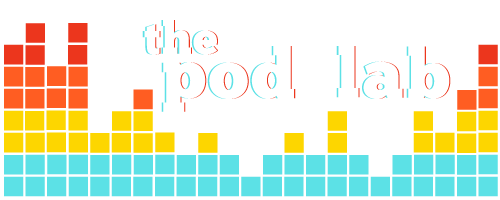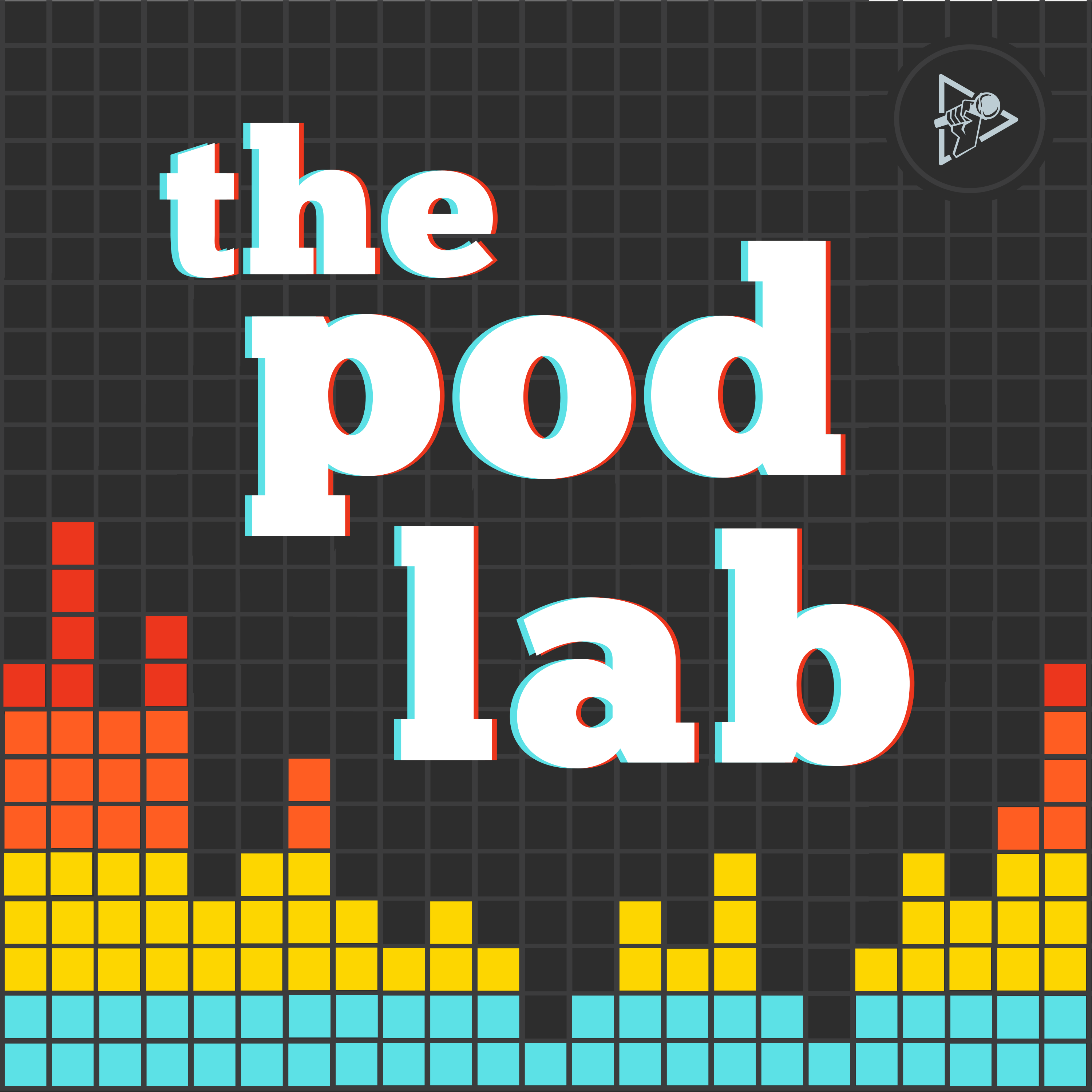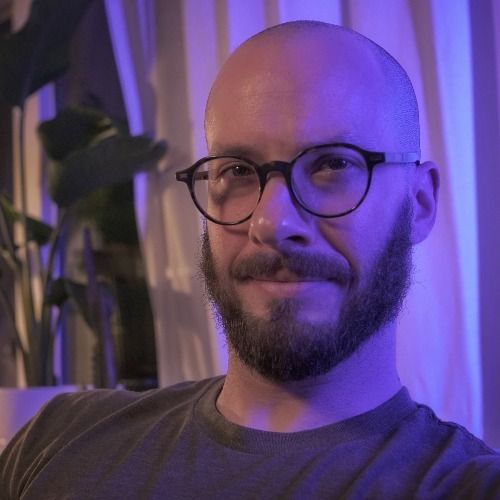Episode 1
Making Better Music Choices
In our first episode, we're talking about the shortest distance between your podcast and a listener’s emotions: music. We'll dive into choosing better songs for your podcast from two perspectives: intro music and narrative music. Whatcha waitin' for? Hit play and let's rock this joint.
Transcript
The shortest distance between your podcast and listeners' emotions is music.
Doug Fraser:Welcome to the pod lab, a Podcast Movement original series.
Doug Fraser:I'm Doug Fraser, producer, and host of the NPR podcast, "What We Do."
Doug Fraser:Today, we're looking at how to choose better music for your podcast.
Doug Fraser:And we're going to tackle that from two perspectives.
Doug Fraser:The first is intro music and the second is narrative music.
Doug Fraser:So let's start with intro music.
Doug Fraser:Your intro music will likely be the same for every episode.
Doug Fraser:So it's important that it suits your show.
Doug Fraser:When trying to choose an intro song for a podcast.
Doug Fraser:I consider three main questions.
Doug Fraser:Question number one, what are the show's themes?
Doug Fraser:So you have an opportunity here to tie the show's themes and the music together, which makes the whole show feel more cohesive.
Doug Fraser:You can do that with the genre of a song or more literally with the lyrics.
Doug Fraser:Question number two.
Doug Fraser:What do you want a listener to feel?
Doug Fraser:If your show is about pop culture, maybe you want the intro music to be energetic and have a bit of a, a snap to the step.
Doug Fraser:If your show is about the infinite possibilities of the cosmos, you may want something more fluid and thought provoking.
Doug Fraser:The third question is more personal.
Doug Fraser:And this is really, to me, I think the biggest question of the three.
Doug Fraser:Does this song make you excited to work on your podcast?
Doug Fraser:When you're listening to your favorite podcasts and you hear the show's music, you get that sense of...
Doug Fraser:being locked into the show, right?
Doug Fraser:The music kicks on, you know, that the show you love is about to start it's the same with TV shows, right?
Doug Fraser:That's what intro music can do.
Doug Fraser:It's, it's sort of, um, a warmup.
Doug Fraser:It's an invitation into this world that you're about to enter, whether that be fiction or nonfiction.
Doug Fraser:It doesn't matter.
Doug Fraser:Now that feeling you get with your favorite shows, you need to feel for your own show.
Doug Fraser:We all know podcasts take a lot of time to produce.
Doug Fraser:There's so many things you have to do so many minor decisions you have to make in order to create this bigger piece.
Doug Fraser:So make sure that you spend the time to get that intro song that really gets you pumped to work on your show.
Doug Fraser:I don't know about you, but when it comes to picking a song, my first choice is often the safe choice.
Doug Fraser:It's one that may work, but it doesn't have, um, like a grit to it.
Doug Fraser:It doesn't have the feeling that...
Doug Fraser:it doesn't necessarily bring the show to life.
Doug Fraser:Sure.
Doug Fraser:It could fit nicely, but I don't want nice.
Doug Fraser:I want the listener to feel something in nice, rarely evokes emotions.
Doug Fraser:So for me, the safe choice is usually a bit boring.
Doug Fraser:So here's the challenge to consider when picking your song.
Doug Fraser:What if you didn't play it safe?
Doug Fraser:What if instead you went with a track that was less middle of the road and more hitting someone in the middle of the chest?
Doug Fraser:So less of this:
Doug Fraser:and more of this:
Doug Fraser:Now let's move on to the second perspective for today, which might be my favorite topic.
Doug Fraser:And that's finding better music for a narrative podcast, the kind of music that breathes life into a scene.
Doug Fraser:And a side note here besides being my favorite topic, it's also one of my biggest time-wasters.
Doug Fraser:What happens is I, uh, I visit a place like art list or any other music subscription service.
Doug Fraser:And...
Doug Fraser:I just become obsessed with collecting.
Doug Fraser:I hear a good song and it may not even be for the project that I'm working on right now, but I want to put it in my cart and have it just in case in the future that I may need it for another show.
Doug Fraser:Right?
Doug Fraser:And so it turns into this ridiculous situation where I will, instead of going into pick one song, spending 15 minutes to grab it, and then moving forward, it'll be two or three hours
Doug Fraser:So as silly as this may sound, if I don't give myself a time limit on how long I'm allowed to search for music, I could honestly just do that all day.
Doug Fraser:Cause it's so much fun to do.
Doug Fraser:I thought this was a problem that was just for me, but reaching out to other people in the community, it sounds like this is a pretty common thing, where, selecting music...
Doug Fraser:the time that we take to do that is way, way more than other pieces of podcasts we may work on because it becomes this obsession.
Doug Fraser:So a way that I get around that is I make sure that I set a time for myself.
Doug Fraser:Let's say, I want to go two songs.
Doug Fraser:I'll just say 30 minutes for that selection.
Doug Fraser:Um, average about 15 minutes of song.
Doug Fraser:And that works well for me.
Doug Fraser:Maybe you need a little bit more time.
Doug Fraser:Maybe you need a little bit less time, but I definitely reccomend setting a time limit.
Doug Fraser:That being said, while I was working on this very episode, you're listening to.
Doug Fraser:I, uh, forgot to set a time limit.
Doug Fraser:So I found a bunch of extra songs like this one called "Wide Open" by Aaron Kellam.
MUSIC:My heart's been ripped wide open, so many mixed emotions.
Doug Fraser:I don't really have a place for it in the episode.
Doug Fraser:But every time I hear it, it makes me want to dance.
Doug Fraser:So I just wanted to share with you guys
Doug Fraser:. MUSIC: I've been set free.
Doug Fraser:I've spent a liftetime running...
Doug Fraser:Anyway, back to the topic at hand, the three big questions I ask when trying to pick better narrative music for my podcasts are:
Doug Fraser:"What is this scene about?"
Doug Fraser:"What do I want the listener to feel?"
Doug Fraser:And "What do I want the listener to see?"
Doug Fraser:Let's say you're telling a story about a world famous circus performer.
Doug Fraser:Okay, so this is one I'm just making up.
Doug Fraser:It's a variation on a few Tim Burton and Pixar movies, but, uh, yeah, let's just go with it and see where it takes us.
Doug Fraser:So the circus performer let's call him Jacob.
Doug Fraser:Jacob was at the top of the world until he was under the foot of an elephant.
Doug Fraser:The weight of it crushed him, sending him to the afterlife
Doug Fraser:Here, I want a similar sounding song to the opening.
Doug Fraser:One that kind of feels like the circus, but gives you an additional sense of movement because now Jacob is in the streets of Death Mountain, where everyone, including himself is a ghost.
Doug Fraser:So there's a little bit of panic and a little bit confusion weaved in there as well.
Doug Fraser:But still, I want it to be light and playful, right?
Doug Fraser:This is not a drama.
Doug Fraser:Over time, Jacob befriends a young girl named Kat who shows him the ropes of being a ghost and they go out to a local ghost pub and have a few too many drinks.
Or if you prefer the punhere:spirits.
Or if you prefer the punhere:I want the music in this scene to not just give the feeling of a night out drinking, but to make you see it as well.
Or if you prefer the punhere:And one big helper here is the use of sound effects, which I'm not using because we'll cover that in a future episode.
Or if you prefer the punhere:So for now, we're at the bar with Jacob and Kat.
Or if you prefer the punhere:And Kat in a stroke of drunken genius, let's out a secret.
Or if you prefer the punhere:She knows how to get back to the world of the living.
Or if you prefer the punhere:Okay, did you hear that sudden cut at the end of the music there?
Or if you prefer the punhere:That wasn't just the song.
Or if you prefer the punhere:That's a little addition to it, that's called a riser.
Or if you prefer the punhere:So here's the riser by itself and here's the music without the riser.
Or if you prefer the punhere:And here they are together.
Or if you prefer the punhere:The riser does a few things.
Or if you prefer the punhere:One is narrative based.
Or if you prefer the punhere:A secret has just been revealed.
Or if you prefer the punhere:Jacob's eyes are probably wide open at hearing this and what the story will likely do after this big reveal is leave you on a cliffhanger, which a riser is great for.
Or if you prefer the punhere:And the story will then move on to another scene, before we come back to the impliKations of the secret.
Or if you prefer the punhere:The other thing a riser does, is it helps hide the cut in the music.
Or if you prefer the punhere:So where the music stops there's no natural ending in the song that I chose.
Or if you prefer the punhere:And that's because the songs are not specially made for this example.
Or if you prefer the punhere:This is a song that is in its entirety pre-made a few minutes long, and we're just using a little piece of that.
Or if you prefer the punhere:So where the music stops, there's no natural ending, it's abrupt and awkward.
Or if you prefer the punhere:So here it is again, without the riser.
Or if you prefer the punhere:The riser helps smooth that ending out.
Or if you prefer the punhere:Back on Death mountain time has passed as Jacob becomes less frantic as he becomes more familiar with his new life and begins to accept where he is, the music reflects this.
Or if you prefer the punhere:Kat denies ever having said anything about the tunnel, because you know, there is no secret tunnel.
Or if you prefer the punhere:Or is there?
Or if you prefer the punhere:Maybe in an upcoming scene Jacob has a moment of reflection about having gone from the life of the living now to Death Mountain.
Or if you prefer the punhere:Eventually Kat learns more about his past and sees how much happier he is in the world of the living.
Or if you prefer the punhere:So she shows him the tunnel.
Or if you prefer the punhere:But there's some big, nasty, bad guy blocking the way.
Or if you prefer the punhere:And somewhere within the story's lore, it was predicted in some mythological book that was found in the back of a library somewhere that talks about the existence of the tunnel and also the
Or if you prefer the punhere:So naturally a battle breaks out.
Or if you prefer the punhere:And, you know, the good guys when it's big, it's epic.
Or if you prefer the punhere:If it were a movie it would cost millions of dollars for the special effects, but because it's a podcast, you're getting away with a much cheaper her version of that battle scene.
Or if you prefer the punhere:In the end, the good guys, win, Kat says a heartfelt goodbye to Jacob, who reappears in the land of living.
Or if you prefer the punhere:He can go back to the circus and live his best life, and there's this moment of change in the story where...
Or if you prefer the punhere:he's come back to the world, but he's now a changed person because he now appreciates life more having lost it.
Or if you prefer the punhere:But in his excitement, he forgot to look both ways when crossing the street.
Or if you prefer the punhere:And in an instant, he was back at Death Mountain.
Or if you prefer the punhere:Now it's time to hear a question from the Podcast Movement Community.
Or if you prefer the punhere:This week's question comes from Dan Hinds.
Dan Hinds:My favorite podcasts are ones that tell great stories where they get great stories out of their guests, but I am a lost on how to do that.
Dan Hinds:How can I tell the difference between a great interview question and a terrible interview question in order to get these stories out of my guest?
Doug Fraser:Dan, thank you for such a great question.
Doug Fraser:There are plenty points of view on an answer to this, but I like to stick to three basic rules when it comes to getting the best stories from my guests.
Doug Fraser:Rule number one, ask one question at a time.
Doug Fraser:So if I ask, "what were you like as a kid?"
Doug Fraser:And "how do you think that affected you as an adult?"
Doug Fraser:And "do you think it's possible for people to recover from their childhoods?"
Doug Fraser:The line of questioning makes sense, but you're sending your guest off into three different directions.
Doug Fraser:So just pick one and hold back on the other two.
Doug Fraser:Ask, "what were you like as a kid?"
Doug Fraser:And see where the interviewee takes it.
Doug Fraser:It may wind up that a story emerges, and the other two questions you were going to ask, become moot points.
Doug Fraser:So ask one question at a time.
Doug Fraser:You don't want them focusing on trying to remember three parts of your, your five-part question.
Doug Fraser:You want your guests to tell a story in a natural, comfortable way, and to see what this feels like, go on the other side, have someone interview
Doug Fraser:Rule number two, ask open-ended questions.
Doug Fraser:If you ask a yes or no question, you'll get a yes or no and not much else.
Doug Fraser:The same goes with questions that are, are set up for one word answers.
Doug Fraser:But like any rule, there are exceptions.
Doug Fraser:For example, to continue with the theme of childhood here.
Doug Fraser:If I ask someone what their favorite toy was as a kid, I'll likely get a short answer, you know, probably just the name of the toy and that's it.
Doug Fraser:But if I have a follow-up question ready such as, "what made that toy so special?"
Doug Fraser:then I'm using a non open-ended question to ease into a deeper story.
Doug Fraser:On the same note, uh, something else I like to keep in mind is to be simple with your questions.
Doug Fraser:As a general rule, the more complex, the question, the simpler, the response.
Doug Fraser:And conversely, the simpler, the question, the more in depth, the response.
Doug Fraser:Give your guests a simpler question and give them that space to pull on the string on their thoughts and to thumb through their memory files.
Doug Fraser:And finally rule number three, commit to curiosity.
Doug Fraser:To me, this is hands down the most important rule because we, when you show you're listening and that you're curious about what your interviewee is saying, they'll
Doug Fraser:Do things like reference what they said earlier or relate their story to one of your own without going too far on the side of, of oversharing or, or taking too much mic time.
Doug Fraser:And also in, instead of moving onto your next question, respond to their answer by asking, "why?"
Doug Fraser:That does it for this week at The Pod Lab.
Doug Fraser:Be sure to subscribe, to get notified of new episodes as they're released.
Doug Fraser:And if you'd like to be featured in a future episode, submit your question at the Podcast Movement Facebook Page.
Doug Fraser:Until next time, keep experimenting.
Doug Fraser:The Pod Lab is a Podcast Movement Original Series.
Doug Fraser:Produced and hosted by me, Doug Fraser.
MUSIC:Stop playing goalie on all the my thoughts speaking now, straight from my heart.
MUSIC:But now I see, but now I see.


